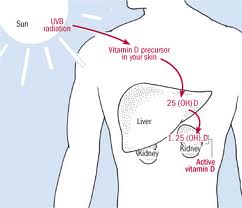You will store more fat this winter because your body has less Vitamin D. The other very important thing to note is that as you get older you need a lot more Vitamin D (As much as 100% more per 10 year difference) and that you need as much as ten times more during winter as in summer.
Vitamin D is a steriod fat-soluble prohormone and the pharmaceutical forms include calcitriol (1alpha, 25-dihydroxycholecalciferol), doxercalciferol and calcipotriene.
In a study by the USA Governement (National Health and Nutrition Examination Survey) it was established that 7.6 million children in the USA were vitamin D deficient. Many more than that number of children in the same study, were found to be have insufficient Vitamin D levels. An amount of obesity cases have been linked to Vitamin D deficiency and it is accepted fact that Vitamin D should be supllemeted in our diet. The exact relationship between obesity and Vitamin D baseline deficiency is currently being studied, but it is accepeted medically that the relationship does exist.
In the days before humans were so well nourished all year round, food was scarcer during winters. Calories would have to be stored to ensure survival. Unfortunately for you, your body has not yet caught up to the fact that we have an abundance of excess calories every day of the year. You can easily address this shortage by exposing more of your skin to sunlight, more regularly.
Sunscreen also blocks out UV-B rays and this means that the Vitamin D synthesis in the skin does not occur and your skin needs direct exposure to sunlight to produce Vitamin D.
How much time should you spend in the sun? You need to absorb 15 to 20 minutes of direct sunlight (UV-B rays) without sunscreen. (Be aware of the risks of cancer when exposed to too much UV-B radiation) Depending which clinical study you read, the average human body requires between 200 and 2000 IU of Vitamin D per day.
If you want to avoid spending time in the sun this winter you can also buy a good vitamin supplement, like SuperSlim, which contains Vitamin D. (Just be aware that the SuperSlim slimmers vitamins also contains iodene, when taking it you should not be allergic to seafood)
Understanding Vitamin D deficiency, insufficiency and averages are important for understanding winter weight loss. Vitamin D deficiency is defined as 15 ng/mL whereas insufficiency is between 15 ng/mL and 30 ng/mL. Some specialists also state that levels should be as much as 500% higher during winter months and that age plays a much understated role in Vitamin D levels. As an example, they state that you need twice as much Vitamin D when you are 70 as compared to age 60 and yet less when you are 50.
There are five known forms of Vitamin D (Vitamin D1, D2, D3, D4 and D5) and they are collectively referenced as calciferol.
Advertising

All information provided for information & education purposes only. Nothing published on https://dietmy.com is intended as substitution for medical advice, diagnosis, or for any treatment.



